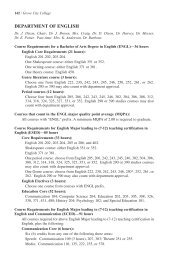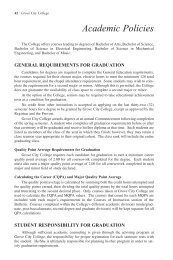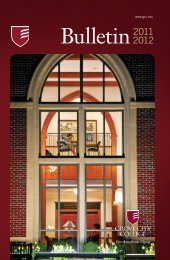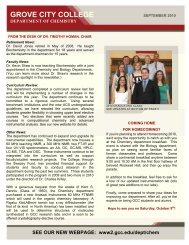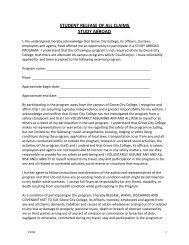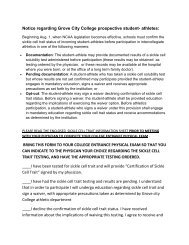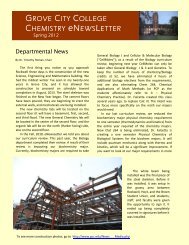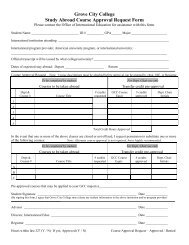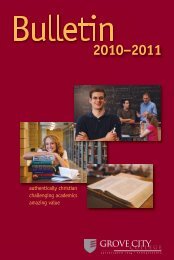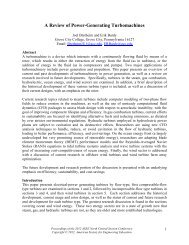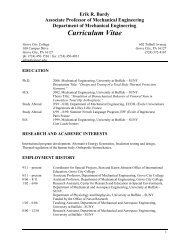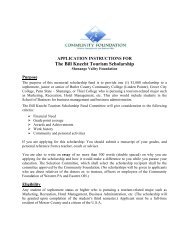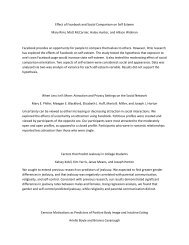2009–2010 - Grove City College
2009–2010 - Grove City College
2009–2010 - Grove City College
You also want an ePaper? Increase the reach of your titles
YUMPU automatically turns print PDFs into web optimized ePapers that Google loves.
Economics / 109<br />
Students completing a major in Business Economics are eligible to pursue a second major<br />
or a minor, if offered, in the related Departments of Accounting, Business or<br />
Entrepreneurship but must complete the hours required for the second major or a minor<br />
beyond the 128 hours required for the Business Economics major .<br />
Courses that count in the BECO major quality point average (MQPA):<br />
All courses with “ACCT,” “BUSA,” and “ECON” prefix, excluding BUSA 205 and<br />
BUSA 206. A minimum MQPA of 2.00 is required to graduate.<br />
Students who have completed a major in Economics should be able to perform and<br />
present economic analysis and understand and critique the economic analysis of others. To<br />
attain these ends, they need to develop skills in locating, evaluating, and using information<br />
and proficiency in writing and speaking. The Department of Economics requires<br />
Economics 420 as a Writing Intensive (WI), Speaking Intensive (SI) and Information<br />
Literacy (IL) course to give students a forum to demonstrate their mastery of these skills.<br />
Course Requirements for a minor in Economics (21 hours)<br />
A minor in Economics consists of Economics 101, 102, 120, and twelve additional<br />
hours in economics.<br />
ECONOMICS (ECON)<br />
ECON 101. PRINCIPLES OF ECONOMICS (MICRO) I. An examination of the fundamental<br />
principles of human action and the laws of the market economy. Focus will be on exchange, prices,<br />
production, costs, entrepreneurship, and government intervention. Semester course, three hours.<br />
ECON 102. PRINCIPLES OF ECONOMICS (MACRO) II. An examination of the fundamental<br />
principles of human action and the laws of the market economy. Focus will be on money, inflation,<br />
credit, interest, capital, economic progress, and business cycles. Semester course, three hours.<br />
ECON 120. FOUNDATIONS OF ECONOMICS. An investigation of the theological, philosophical<br />
and epistemological foundations of economics. The nature of man and the created world, laws of<br />
action and interaction, and the good society will be explored. Semester course, three hours.<br />
ECON 202. ECONOMIC EXPANSION AND DEVELOPMENT. A study of economic progress<br />
with emphasis on the developing world. Topics include wealth, poverty, capital accumulation, and foreign<br />
aid. Alternate Spring semesters, three hours.<br />
ECON 204. ENVIRONMENTAL ECONOMICS. An investigation of environmental, conservation,<br />
and population issues. Pollution, natural resource use, demographic changes, and technology will be<br />
studied. Alternate Spring semesters, three hours.<br />
ECON 206. COMPARATIVE ECONOMIC SYSTEMS. An analysis of different economic systems.<br />
The command economy, various forms of the mixed economy, different types of interventionism,<br />
and the market economy will be compared and contrasted.Alternate Fall semesters, three hours.<br />
ECON 207. LABOR ECONOMICS. An analysis of the working of labor markets. Labor unions<br />
and labor legislation and regulation will be examined. Alternate Fall semesters, three hours.<br />
ECON 209. ENTREPRENEURSHIP AND ENTERPRISE. An examination of entrepreneurship<br />
and its role in society. The contribution of creativity, foresight, and other attributes of entrepreneurs to<br />
the working of both for-profit and not-for profit enterprises will be explores.<br />
Spring semester only, three hours.<br />
ECON 213. AMERICAN ECONOMIC HISTORY TO 1860. A survey of the American economy<br />
from colonial days to the Civil War. Economic progress and business cycles will be examined with<br />
emphasis on how the market economy was developed by entrepreneurs hampered by politicians.<br />
Alternate Fall semesters, three hours.



